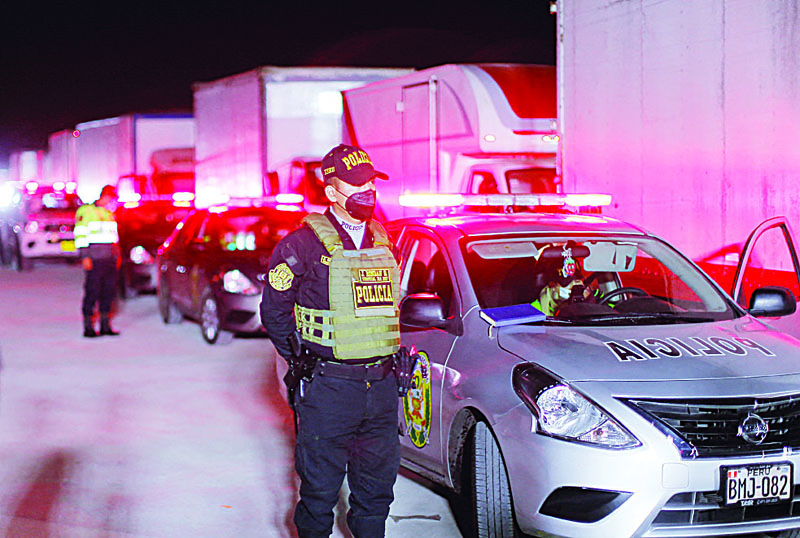 LURIN: Peruvian police forces stand guard next to a fleet of trucks as they prepare to leave Lurin, near Lima, on their way to distribute voting material to voting stations ahead of the presidential election runoff. – AFP
LURIN: Peruvian police forces stand guard next to a fleet of trucks as they prepare to leave Lurin, near Lima, on their way to distribute voting material to voting stations ahead of the presidential election runoff. – AFP
CHOTA: Chewing on coca leaves and brandishing whips, 15 Peruvian peasants patrol the paths around an Andean hamlet in the dead of night, just like presidential candidate Pedro Castillo once did. The "peasant patrols" were created more than four decades ago in the Cajamarca region some 900 kilometers north of the capital Lima, initially to prevent the theft of livestock. But during Peru's armed conflict between 1980 and 2000, the patrols were also forced to fight off incursions by Maoist Shining Path guerrillas.
One patrolman in Cajamarca was Castillo, a rural schoolteacher who was born and raised in this region, and who will take on seasoned corruption-tainted politician Keiko Fujimori in Sunday's second round runoff. The patrolmen of rural Peru feel marginalized by elites ruling from the urban power centers, but socialist Castillo is one of their own. They're pinning their hopes on him winning and providing more support to the rural poor. "We hope to elect a democratic government that views the whole population as equals," Aladino Burga, the president of the Chota Peasant Patrols in Cajamarca, told AFP.
"Castillo needs to win because we get screwed a lot in Peru. We want jobs for the poor, we want Peru to progress," added Dagoberto Vasquez, a hat seller who has led patrols around the hamlet of San Antonio de Iraca for decades. One thing the patrolmen are banking on is Castillo putting an end to the corruption that has gripped Peruvian politics for decades.
Former president Alberto Fujimori (1990-2000) is currently serving a 25-year jail sentence for crimes against humanity and corruption, while four more ex-presidents since his rule have also been accused of corruption. And Fujimori's daughter, Keiko, is herself being investigated for graft relating to illegal funding for her previous presidential campaigns in 2011 and 2016. "I'm convinced Castillo will win because he's a professor and won't get involved in corruption," said Vasquez, 82. "Because if he does get involved in that, we'll kick him out!"
Community policing
The 15 patrolmen, dressed in ponchos and rubber boots, some wearing high-topped hats like Castillo, and chewing the coca leaves that are popular in Andean communities for alleviating feelings of hunger and fatigue, perform daily nighttime rounds in Chota, a municipality at 2,300 meters above sea level. The patrols are a form of voluntary community policing in rural areas with little police presence.
During the 1980s, these patrols extended across almost all of rural Peru. An AFP team accompanied the 15 patrolmen one night through corn, alfalfa and vegetable plantations in Cuyumalca, the site of the first ever patrol in 1976. At one point they stopped a man in his 60s who was walking in the dark with two horses, questioning him on where he lived and trying to find out if he really owned the animals. Unimpressed with his answers, they took him back to their shelter to spend the night.
The next morning they would fill out a report and continue their investigations. If he were found to be telling the truth he would be released, if not, he would be handed over to the police. The patrolmen also stop suspicious vehicles to verify the occupants' identities and find out what they're up to.
'Betting on change'
"I feel fulfilled because we've brought peace, tranquility to the community. The people feel protected," Segundo Belizario Heredia Idrogo, 61, told AFP. He said the patrols "emerged as a response to the lack of state protection for the rights of people in rural areas." "We're betting on change and we're betting on Pedro Castillo. We hope Pedro Castillo won't betray Peruvians," said Heredia, who carried a wooden stick and a leather whip.
"If he does, we'll be in the streets demanding more democracy and justice for Peru." "We're proud that Castillo was a patrolman," said Heredia, who has two patrolmen sons and like Castillo is a teacher. There are 26,000 patrolmen amongst the population of 143,000 in the Chota province, but they complain of never having had support from the state, which they view as biased towards urban centers like the capital Lima. - AFP




